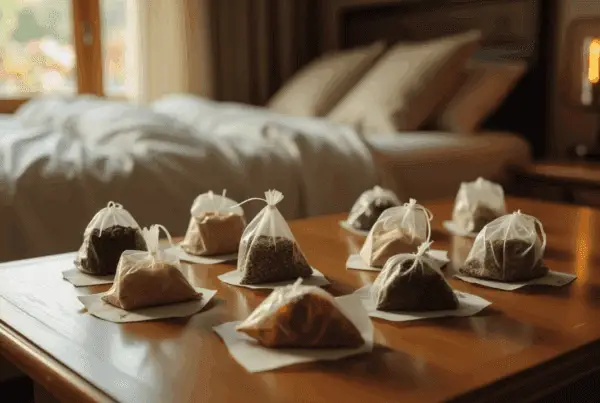If you’ve ever felt overwhelmed by stress, you’re not alone—many people are searching for natural alternatives to support emotional and physical calm. Herbs for relaxation have emerged as a gentle, effective way to ease both mind and body without the side effects of conventional options. With calming plants like chamomile, valerian root, lemon balm, and passionflower, it’s possible to create a daily ritual that nurtures balance. But how can you choose the right ones for your needs? Understanding their unique qualities may help you develop a soothing solution tailored to your lifestyle.
Why Herbs Are Gaining Popularity for Relaxation
As people continue seeking natural ways to manage tension, the use of calming herbs is on the rise. These gentle plant-based remedies offer support for stress without the grogginess or side effects of medications. For example, valerian root and lemon balm are both known to work with the body’s natural relaxation systems, helping to reduce anxious feelings. Their versatility also makes them easy to add to tea blends or supplements, depending on your preference. The growing interest in herbal tea rituals reflects a larger desire to unwind mindfully. By choosing stress-relieving herbs that fit your personal routine, you’re taking a proactive step toward greater mental and physical well-being.
Chamomile: A Gentle Herb for Calming the Mind
Chamomile has long been regarded as one of the most soothing herbs available, particularly when it comes to promoting calm and rest. Sipping chamomile tea in the evening is more than just a comforting habit—it’s a way to signal to your body that it’s time to unwind. This herb’s gentle compounds help settle the nervous system and reduce feelings of restlessness. Chamomile is especially helpful at the end of a demanding day, offering a moment of stillness. As a popular choice in bedtime tea blends, it encourages a steady transition into restful sleep. Adding chamomile to your nightly practice can be a subtle yet powerful way to support mental clarity and create a more relaxed state of being.
Valerian Root and Its Effect on Physical Tension
When stress takes a toll on your body, valerian root may be a helpful herb to consider. Known for its ability to ease muscular tightness and promote deep relaxation, valerian works by influencing the nervous system. This herb is often included in herbal teas or natural sleep remedies because of its support for both physical and emotional tension. Taking valerian before bed can help reduce the time it takes to fall asleep while also soothing the body from head to toe. Whether you choose a capsule, tea, or tincture, valerian root’s calming qualities may help you experience a more complete sense of physical ease. Its ability to calm the body without dependence makes it a smart option for natural stress management.
Lemon Balm and Passionflower for Emotional Balance
While valerian targets muscle relaxation, other herbs like lemon balm and passionflower focus on emotional stress. Lemon balm’s soothing properties help calm irritability and mental fatigue, making it an ideal herb to promote peace. Passionflower, on the other hand, offers gentle support for those facing anxious thoughts, helping to create mental stillness. These two herbs are often used together because of their complementary actions: lemon balm’s relaxing effects blend smoothly with passionflower’s quieting touch. When included in your herbal routine, they help establish a tranquil emotional state. Whether taken as tea or supplements, these herbs can form part of a calming ritual designed to restore inner balance and improve overall well-being.
How to Blend Herbal Teas for Stress Relief
Blending calming herbs into a single tea can offer a synergistic experience that enhances relaxation. Start by choosing a base of chamomile and valerian root for their established effects on sleep and physical tension. To balance the blend, include lemon balm for emotional support and passionflower to help quiet racing thoughts. Add one to two teaspoons of your dried herbs to hot water, steeping them for five to seven minutes. As the flavors combine, they create a warm, grounding infusion that supports your transition into rest. This blend can be a perfect end-of-day ritual, giving you the opportunity to unwind naturally while nourishing your body and mind.
Choosing the Right Relaxing Herbs for Your Needs
With so many herbs available, finding the right combination for your personal routine starts with identifying your stress triggers. If your primary concern is an overactive mind, chamomile and passionflower might be most effective. For physical restlessness or sleep challenges, valerian root could be a better choice. If your stress shows up as irritability or emotional strain, lemon balm may be ideal. Consider whether you prefer tea, tinctures, or capsules, and think about how these forms fit into your lifestyle. Experimenting with small amounts of each herb can help you gauge your body’s unique response. Finding your perfect match takes time, but the benefits of relaxation and balance are well worth the effort.
Safety Tips and Who Should Avoid These Herbal Remedies
Even natural solutions should be approached with care. While herbs like chamomile, valerian root, lemon balm, and passionflower are generally safe for most people, it’s important to speak with your healthcare provider before beginning any new routine—especially if you’re pregnant, nursing, or managing a health condition. Some herbs may interact with medications or affect hormone levels. For instance, valerian may increase drowsiness when taken with sedatives, while lemon balm might influence thyroid function. If you notice digestive upset or allergic reactions, stop use immediately and consult a professional. The safest approach is to begin slowly and listen to how your body responds. Used mindfully, these herbs can be a gentle, effective way to support your well-being.




